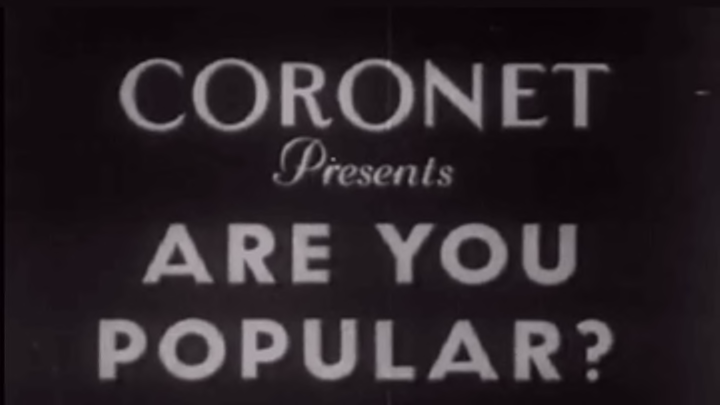In decades past, short films were used in classrooms to show young people how to get along in society. They were starchy, unrealistic, and authoritarian. Despite all that, most of the advice they give isn’t bad. They promote courage, kindness, and inclusiveness (unless you’re Jenny—see below). It’s the package the information is delivered in that’s the problem. Here we look at mid-century ideals of How To Be Popular.
1. Are You Popular?
I’ll tell you who isn’t popular. Jenny. That make-up-caking, over-accessorized floozy who thinks parking in cars with boys is the key to popularity. In daylight, none of those boys will even make eye contact with her. There is a reason they’re called “ladies of the night,” Jenny.
Then take Caroline, who floats through the film like a large Shirley Temple on Xanax. She is on the path to being beloved by all. She helps wrangle props, and only accepts dates offered a week in advance, because she is a lady of quality.
That’s why she has to turn down Jerry, the short-sighted chap who thought he could get a same-day date with her. Who does she look like, Jenny?
2. The Other Fellow’s Feelings
In the 1950s, bullies who didn’t do actual bodily harm to their victims got to wear the much more innocent moniker of “teasers.” In this film, you’ll meet Jack, who is an absolute ass. It’s not enough that he “accidentally” knocks Judy’s first real perfume out of her hand and shatters it, he has to go on for weeks “teasing” her about how smelly she is. Judy doesn’t tattle, or retaliate, and no one defends her with any heart. Eventually she breaks down, unable to take it anymore. When the film asks the final question, “What would you do?” it’s hard to think of any responses that don’t involve establishing an alibi first.
3.The Snob
Sarah works harder than you, schlub. She studied for hours for the history test, not like the rest of those apple-polishers. She worked her pencil-skirted patoot off to design a classy yearbook cover, but everyone chose that galoot Bill Tyler’s instead! No one appreciates her. So Sarah spends Friday nights with her only friend, Algebra, glaring daggers at Don’s never-ending party pad across the yard. Because Sarah is a snob. Can she be helped? Should the gang judge her so harshly? And what of the yearbook cover? So many questions left dangling.
4. The Outsider
The narrator of this film spends the majority of the story endeavoring to irreparably damage the psyche of a young girl.
This film starts with poor, unwanted Susan Jane, huddled against a wall, watching other children, even the fat ones, enjoy life. From there she must endure the merciless taunting of the narrator:
“Susan? Susan Jane. What’s the matter with you? Why is everyone else having such a good time when you’re not? Why do they always leave you out? What makes you the outsider? The Outsider. The one who never gets asked.”
The narrator keeps pace with all of little Susan’s failures. Not invited to a study date? “Even in things you’re good at, why do they make you the outsider?” Order a root beer while everyone else ordered chocolate ice cream? “Why are you the one who’s always out of step?” You disgust me, Susan Jane.
He works so efficiently that when poor Susan Jane does get invited to a party, she drops the phone and collapses into heaving sobs of shame over her unworthiness. Even in the last frames, as Susan bravely prepares to attend the party putting everything she has into presenting herself as a likable girl, that bastard is on her heels. “But is this enough? Will it work? Will the gang accept you, Susan Jane?”
We are never told the answer. Hopefully because the happiness Susan Jane finds silences the demon voice forever.
5.The Shy Guy
Suppose you were an alien who had recently taken over the body of a teenage boy. How would you go about best understanding the human teenagers around you, and convince them that you were one of them? This 1947 film, The Shy Guy, would be your guide.
Phil (Dick York, the first Darrin from Bewitched) spends a lot of time in the basement, wearing a disheveled suit and playing with radios, presumably to contact the home world. He is failing horribly at his assimilation directive. His mission commander (called “Dad”) councils Phil to “keep an eye” on the most popular kids in school to learn of their ways.
Phil, dressed in the worst “It’s okay, I’m one of you!” camouflage sweater on Earth, begins his observations of humans in their natural habitat. Eventually Phil and “Dad” come to the conclusion that the key to fitting in with the humans is to display similar emotions to theirs, and feign empathy for their weakened human condition. The film closes with Phil using his superior knowledge of electronics to successfully infiltrate the population.
